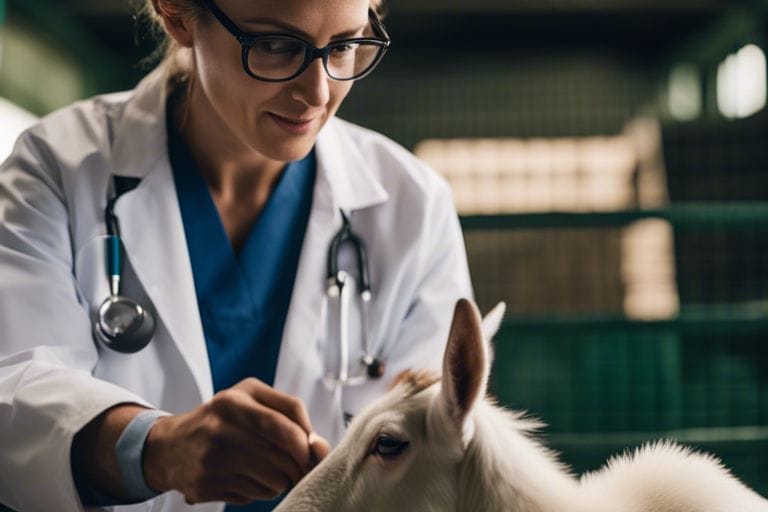Most goats are hardy animals, but like all living creatures, they can be susceptible to various health issues. In this blog post, we will explore some of the common health problems that goats may encounter, shedding light on animal health awareness in the goat farming community. By understanding and recognizing these common health issues, goat owners can take proactive steps to ensure the well-being and longevity of their beloved animals.
Key Takeaways:
- Goats can be susceptible to common health issues such as parasites, respiratory infections, and hoof problems.
- Regular health checks and monitoring for signs of illness are crucial in maintaining the well-being of goats.
- Proper nutrition, clean living conditions, and access to clean water are imperative for preventing many common health issues in goats.
Common Health Issues in Goats
Parasitic Infestations
The goats are susceptible to various parasitic infestations, including worms like gastrointestinal nematodes and external parasites such as mites and lice. These parasites can cause a range of health issues, including weight loss, anemia, and poor coat condition. Regular deworming and proper pasture management are necessary in preventing and controlling parasitic infestations in goats.
Respiratory Problems
With their sensitive respiratory systems, goats are prone to respiratory problems when exposed to dusty or moldy environments. Common respiratory issues in goats include pneumonia and chronic coughing. Ensuring good ventilation in their living quarters and providing clean, dust-free bedding can help prevent respiratory problems in goats.
Respiratory problems in goats can be exacerbated by overcrowding and poor sanitation. It is crucial to keep their living areas clean and well-ventilated to minimize the risk of respiratory illnesses.
Nutritional Deficiencies
The goats may suffer from nutritional deficiencies if they do not have access to a well-balanced diet. Common nutritional deficiencies in goats include lack of necessary minerals like copper, selenium, and calcium. These deficiencies can lead to poor growth, reproductive issues, and weak immune systems. Supplementing their diet with mineral blocks and ensuring they have access to a variety of forages can help prevent nutritional deficiencies in goats.
The nutritional requirements of goats vary depending on factors such as age, breed, and reproductive status. Understanding their specific nutritional needs is crucial in ensuring the overall health and well-being of goats.

Gastrointestinal Health
You may encounter various gastrointestinal health issues with goats. It’s vital to be aware of common problems and how to address them to ensure the well-being of your animals.
Diarrhea and Scours
Health issues such as diarrhea and scours can be quite common in goats and are often caused by dietary changes, parasitic infections, bacterial infections, or viral illnesses. It’s imperative to monitor your goats for any signs of diarrhea, as it can quickly lead to dehydration and other common health issues.
Abdominal Pain and Bloating
One common gastrointestinal issue that goats may experience is abdominal pain and bloating. This can be caused by various factors, including overeating, consuming toxic plants, or a buildup of gas in the digestive tract. It’s crucial to address bloating promptly, as it can be a sign of a more severe condition such as bloat, which can be life-threatening if not treated quickly.
Diarrhea caused by sudden dietary changes or bacterial infections can lead to imbalances in the gut flora of goats, resulting in abdominal pain and bloating. Proper management practices, such as gradual dietary transitions and regular monitoring for signs of bloating, can help prevent these issues.
Liver and Pancreatic Issues
Abdominal pain, jaundice, and changes in appetite can be indicative of liver and pancreatic issues in goats. These organs play a crucial role in the digestion and metabolism of nutrients, so any abnormalities should be addressed promptly. Common causes of liver and pancreatic issues in goats include infections, toxins, and metabolic disorders.
Another important consideration is the impact of liver and pancreatic issues on the overall common health issues and productivity of goats. Monitoring their liver and pancreatic function through regular veterinary check-ups and implementing appropriate management practices can help prevent and manage these health issues effectively.

Infectious Diseases
Pneumonia and Other Respiratory Infections
After infectious diseases, pneumonia and other respiratory infections are some of the most common health issues that can affect goats. These respiratory infections are often caused by bacteria, viruses, or fungi, and can lead to symptoms like coughing, nasal discharge, and difficulty breathing.
It is crucial to monitor the overall health of your goats and make sure they are housed in well-ventilated areas to prevent the spread of respiratory infections among the herd.
Skin Infections and Abscesses
Other infectious diseases that can impact goats are skin infections and abscesses. These can be caused by bacteria entering the skin through wounds or cuts, resulting in painful swelling and pus-filled abscesses.
Another important aspect of managing skin infections and abscesses is practicing good hygiene and promptly treating any wounds to prevent infections from taking hold. Regularly inspecting your goats’ skin and addressing any cuts or injuries promptly can help reduce the risk of these common health issues.
Internal Parasites and Worm Infestations
Infectious diseases such as internal parasites and worm infestations can also pose a threat to the health of goats. These parasites can cause a range of symptoms, including weight loss, diarrhea, and anemia, if left untreated.
A thorough understanding of the types of internal parasites common in goats, as well as regular fecal testing and deworming protocols, are necessary for managing and preventing the spread of these harmful infections.
Reproductive Health
Now, let’s probe into the reproductive health of goats, as it plays a crucial role in the sustainability of any goat farm or homestead.
Breeding and Pregnancy Complications
The breeding and pregnancy process in goats can sometimes come with complications. It’s crucial to monitor the health of both the male and female goats to ensure successful breeding. Common issues include infertility, low conception rates, and pregnancy toxemia, which can be life-threatening for the pregnant doe. Proper nutrition, veterinary care, and monitoring can help mitigate these risks.
Uterine Infections and Abnormalities
Uterine infections and abnormalities can affect the reproductive health of female goats. These conditions can lead to infertility, miscarriages, or difficult births. It’s crucial to watch for signs of uterine infections, such as discharge, foul odor, or behavioral changes in the doe.
Plus, regular veterinary check-ups, proper hygiene practices, and a clean living environment can help prevent uterine infections and abnormalities in goats.
Kidney and Urinary Tract Issues
Reproductive health in goats can also be impacted by kidney and urinary tract issues. Kidney stones, urinary tract infections, and other kidney-related problems can affect the overall health and reproductive capabilities of goats. These issues can cause discomfort, lead to infertility, or even result in death if left untreated.
Another aspect to consider is providing ample clean water, a balanced diet, and proper sanitation to help prevent kidney and urinary tract issues in goats.
Hoof and Dental Health
Hoof Rot and Lameness
On occasion, goats may suffer from hoof rot, a bacterial infection that affects the hooves, leading to lameness. Hoof rot is often caused by damp and unsanitary conditions where bacteria thrive, such as muddy pens or pastures. It is crucial to regularly inspect your goats’ hooves and keep their living environment clean and dry to prevent hoof rot.
Dental Problems and Malocclusion
Hoof rot is not the only concern when it comes to goat health; dental issues can also arise. Goats with malocclusion, where the teeth do not align properly, may have difficulty eating and maintaining proper dental health. Regular dental check-ups by a veterinarian can help identify and address any dental problems early on, ensuring your goats can continue to eat and thrive.
For instance, some goats may develop sharp points on their teeth that need to be filed down to prevent oral discomfort and eating difficulties. Additionally, older goats may experience tooth loss, which can impact their ability to chew food properly and lead to nutritional deficiencies.
Gum Disease and Tooth Loss
Problems like gum disease can also affect the dental health of goats, leading to tooth loss and difficulty eating. Gum disease can be caused by poor dental hygiene, diet, or bacterial infections in the mouth. Regularly checking your goats’ gums for any signs of inflammation, redness, or bleeding can help detect gum disease early and prevent tooth loss.
It is vital to provide your goats with a balanced diet, regular dental check-ups, and a clean living environment to prevent common dental issues and ensure their overall health and well-being.
Environmental and Management Factors
Once again, the health of goats can be greatly influenced by environmental and management factors that may compromise their well-being. These factors can include poor living conditions, inadequate nutrition, water quality, stress, and overcrowding.
Poor Living Conditions and Sanitation
An important aspect of goat health is ensuring they have a clean and hygienic living environment. Poor sanitation can lead to an increased risk of diseases and parasites. Goats kept in dirty, overcrowded conditions are prone to hoof problems, skin issues, respiratory infections, and gastrointestinal disorders. Therefore, it is crucial to provide goats with adequate space, clean bedding, and proper waste management to maintain their health.
- Ensure proper ventilation in the living area.
- Regularly clean and disinfect the living quarters.
- Provide access to clean water sources.
Assume that improving living conditions and maintaining good sanitation practices can significantly reduce the risk of health issues in goats.
Inadequate Nutrition and Water Quality
With goats being ruminant animals, their diet plays a vital role in their overall health and well-being. Inadequate nutrition, such as lack of important nutrients or poor-quality forage, can lead to various health problems.
Inadequate water quality can also impact goats’ health, causing dehydration, reduced feed intake, and poor digestion. Water sources contaminated with harmful substances or pathogens can pose serious health risks to goats.
Stress and Overcrowding
Stress
Conditions
Conclusion
Drawing together the various health issues that can affect goats, this article sheds light on the common ailments that owners need to be aware of. By understanding these health issues, goat owners can take proactive measures to prevent and/or treat them, thereby ensuring the overall health and well-being of their animals. Regular health checks, proper nutrition, vaccinations, and a clean living environment are crucial components of keeping goats healthy and happy.
By promoting animal health awareness in the goat-owning community, we can help to minimize the prevalence and impact of these common health issues. Ultimately, a well-informed and vigilant approach to goat health care is key to ensuring the longevity and vitality of these fascinating creatures.
FAQ
Q: What are some common health issues that goats may face?
A: Goats can be susceptible to a variety of health issues including parasites, respiratory infections, and hoof problems.
Q: How can I prevent parasites in my goats?
A: Regular deworming, maintaining clean living conditions, and rotational grazing can help prevent parasites in goats.
Q: What are signs that my goat may have a respiratory infection?
A: Signs of a respiratory infection in goats include coughing, nasal discharge, rapid breathing, and decreased appetite.
Q: How can I keep my goats’ hooves healthy?
A: Regularly trimming hooves, providing clean and dry living areas, and monitoring for signs of hoof rot can help keep goats’ hooves healthy.
Q: Are there vaccines available to protect goats from common illnesses?
A: Yes, there are vaccines available to protect goats from diseases like tetanus, enterotoxemia, and pneumonia.











One Response